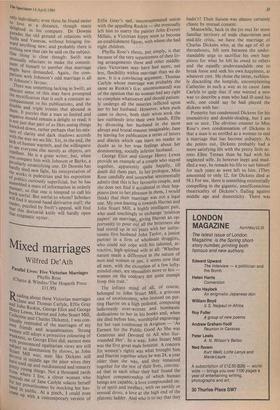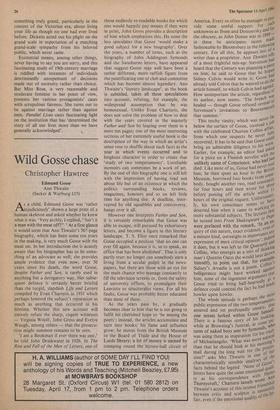Mixed marriages
Wilfred De'Ath
Parallel Lives: Five Victorian Marriages Phyllis Rose
(Chatto & Windus/The Hogarth Press £11.95) Reading about these Victorian marriages (Jane and Thomas Carlyle, Effie Gray and John Ruskin, George Eliot and George HenrY Lewes, Harriet and John Stuart Mill, Catherine and Charles Dickens), I was con- tinu allY reminded of the marriages of my Own friends and acquaintances. Strong women still adopt a protective colouring of weakness, as George Eliot did; earnest men with pronounced egalitarian views are still subject to domination by shrews, as John Stuart d Mill was men like Dickens still hivorce _
ill
) middle age the poor nd wives they arettyve used up and outdistanced and remarry If,. Young things. Not a thousand yards ;urn. where I live, a clever woman who for me of Jane Carlyle solaces herself bir)r her powerlessness by mocking her hus- cand ni Public. contemn a ch, I could even nine up with a cporary version of
Effie Gray's sad, unconsummated union with the appalling Ruskin — she eventually left him to marry the painter John Everett Millais, a Victorian hippy soon to become an establishment figure, with whom she had eight children. Phyllis Rose's thesis, put simply, is that because of the very separateness of their liv- ing arrangements these and other middle- class Victorians may have had more, not less, flexibility within marriage than we do now. It is a convincing argument. Thomas Carlyle whose marriage was probably the same as Ruskin's (i.e. unconsumated) was of the opinion that no woman had any right to complain whatsoever and should patient- ly undergo all the miseries inflicted upon her by her husband. However, when push came to shove, both their wives took the law ruthlessly into their own hands, Effie by divorcing her husband in the most abrupt and brutal manner imaginable; Jane by leaving for publication a series of letters and diarieS which can leave no reader in doubt as to her true feelings about her domineering, socially inferior husband.
George Eliot and George Henry Lewes provide an example of a couple who stayed together, apparently quite happily, till death did them part. In her prologue, Miss Rose candidly and somewhat sentimentally admits that this is her favourite couple, and she does not find it accidental to their hap- piness (nor to her pleasure in them, I would think) that their marriage was not a legal one. My own leaning is towards Harriet and John Stuart Mill, a highly intelligent pair, who used touchingly to exchange 'position papers' on marriage, giving Harriet an op- portunity to pour out all the bitterness she had stored up in six years with her unfor- tunate first husband John Taylor, a junior partner in a firm of wholesale druggists, who could not cope with his talented, at- tractive, high-spirited wife at all: 'Whether nature made a difference in the nature of men and women or not, it seems now that all men, with the exception of a few lofty- minded ones, are sensualists more or less women on the contrary are quite exempt fronii this trait.' The loftiest mind of all, of course, belonged to John Stuart Mill, a grievous case of uxoriousness, who insisted on put- ting Harriet on a high pedestal, composing ludicrously over-written and bombastic dedications to her in his books and, when she died before him, worshipful engravings for her vast tombstone in Avignon — 'As Earnest for the Public Good As She was Generous and Devoted to All who Sur- rounded Her'. In a way, John Stuart Mill was the first great male feminist. A concern for women's rights was what brought him and Harriet together when he was 24, a year older than she was, and they remained together for the rest of their lives, convinc- ed that in each other they had found the
highest companionship of which human beings are capable, a love compounded on- ly of spirit and intellect, with no earthly or sensual dross, a love at the high end of the platonic ladder. And who is to say that they hadn't? Their liaison was almost certainly chaste by mutual consent.
Meanwhile, back in the (to me) far more familiar territory of male chauvinism and mid-life crisis, we have the marriage of Charles Dickens who, at the age of 45 or thereabouts, felt torn between the under- standable urge to sacrifice his own hap- piness for what he felt he owed to others and the equally understandable one to break loose and seek his own happiness, at whatever cost. He chose the latter, ruthless- ly discarding the lumpish, uncomplaining Catherine in such a way as to cause Jane Carlyle to quip that if one wanted a new way to describe a man who had ill-used his wife, one could say he had played the dickens with her.
Posterity has condemned Dickens for his insensitivity and double-dealing, but I am not so sure. The obvious counter to Miss Rose's own condemnation of Dickens is that a man is as entitled as a woman to end a marriage that has become unhappy. As she points out, Dickens probably had a more satisfying life with the pretty little ac- tress Ellen Ternan than he had with his neglected wife. In however inept and mud- dled a way, he remade his life to suit himself for such years as were left to him. (They amounted to only 12, for Dickens died at 58.) For me, there is something existentially compelling in the gigantic, unselfconscious theatricality of Dickens's flailing against middle age and domesticity. There was something truly grand, particularly in the context of the Victorian era, about living your life as though no one had ever lived before. Dickens acted out his plight on the grand scale in expectation of a matching grand-scale sympathy from his beloved public, which never came.
Existential means, among other things, never having to say you are sorry, and this fascinating study of 19th-century marriage is riddled with instances of individuals determinedly unrepentant of decisions made out of necessity rather than choice. But Miss Rose, a very reasonable and moderate feminist in her point of view, presents her various protagonists' cases with scrupulous fairness. She turns out to be against marriage rather than against men. Parallel Lives casts fascinating light on the institution that has 'determined the story of all our lives more than we have generally acknowledged'.











































 Previous page
Previous page